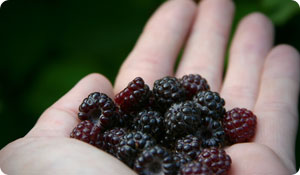
See what people are saying about this article on our Facebook page!![]()
Next time you make a fruit salad-why not toss in some black raspberries? It turns out that these sweet little berries may play a key role in preventing colon cancer, according to a University of Illinois at Chicago study that was reported in a recent issue of Cancer Prevention Research.
The study divided strains of mice (all of which had tumors) into two groups. One group was fed a freeze-dried black raspberry powder with their food for 12 weeks. Among the animals that were fed the raspberry-supplemented food, the tumor incidence was reduced by 45 to 50 percent. So far, there hasn't been a similar trial with humans, but researchers are hoping to start clinical trials soon.
Colorectal cancer is the third most common cancer, according to the National Cancer Institute. There were 102, 900 new cases of colon cancer in the U.S. last year, and 39,670 new cases of rectal cancer.
Earlier research has already demonstrated that black raspberries have antioxidant, anti-cancer, and anti-inflammatory properties, notes Lisa Ganjhu, DO, of St. Luke's-Roosevelt Hospital in New York City. In general, she says, "Studies on berries with regard to colon cancer are very supportive in cancer prevention. Black and red raspberries, blackberries, and elderberries all have compounds that are believed to prevent some forms of cancer." But, she adds, that doesn't mean people should try to consume a pound of blackberries daily.
Toomas Sorra, MD, an attending gastroenterologist at Long Island College Hospital in New York City, says his high-risk patients often ask him what they can do, diet-wise, to decrease their risk of developing colon cancer. "And I tell them there are some uncontrolled studies that show that decreasing fat in the diet, increasing the amount of fiber, and eating more black raspberries may be helpful," Sorra says.
Other factors that may increase your risk of colon cancer are smoking, drinking alcohol, not exercising, and being overweight, according to the National Cancer Institute. The jury's still out on whether red meat increases your risk, with some studies saying yes and others saying no.
If you decide to bump up your intake of berries, keep frozen berries in mind. They have all the nutrients of fresh ones, and they're less expensive when fresh berries aren't in season, Ganjhu says.
Ideas for Eating Blackberries and Raspberries:
- Stir them into yogurt
- Layer them in a parfait glass with walnuts and yogurt
- Sprinkle them into pancake mix
- Make berry shortcake
- Put berries into a green salad or a fruit salad
- Bake them in muffins
- Top them over lowfat frozen yogurt
See what people are saying about this article on our Facebook page!![]()
Sources:
Sreeraman, VR. "Black Raspberries Highly Effective in Fighting Colon Cancer." 3 November 2010. Medindia.net.
http://www.medindia.net/news/Black-Raspberries-Highly-Effective-In-Fighting-Colon-Cancer-76182-1.htm
Xiuli Bi, Wenfeng Fang, Li-Shu Wang, Gary D. Stoner, Wancai Yang, "Black raspberries inhibit intestinal tumorigenesis in Apc1638+/- and Muc2-/- mouse models of colorectal cancer." November 2010. Cancer Prevention Research.
http://cancerpreventionresearch.aacrjournals.org/content/3/11/1443.abstract
National Cancer Institute: Colon and rectal cancer.
http://www.cancer.gov/cancertopics/types/colon-and-rectal





